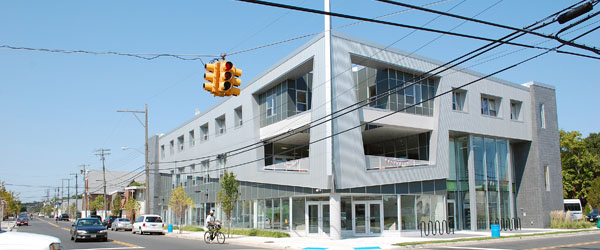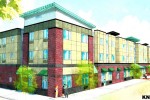The city council approved a payment-in-lieu-of-taxes program for the Springwood Center at the Nov. 19 council meeting.
The program allows local nonprofit group Interfaith Neighbors to pay 5.5 percent of their annual gross revenue from the building for the first 15 years of the center’s existence. After that, payment will increase incrementally over 20 years until the center is paying 100 percent of its assessed property taxes.
Interfaith Neighbors owns most of the Springwood Center. The entire second floor and the police substation on the first floor are owned by the city.
“This is a joint venture,” Reidy said of the Springwood Center. “The developer for this was Interfaith Neighbors. This was done in partnership with the city of Asbury Park and the best example of the benefit of this structure is what happened post-Sandy,” when up to 700 people per day were fed at the senior center.
The payment-in-lieu-of-taxes plan is made possible by a long-term tax abatement statute, which was crafted by the state “specifically for projects of this nature, where a project could not go forward but for a tax abatement agreement for the developer,” city manager Terence Reidy said. The developer in this case is Interfaith Neighbors.
Estimates suggest that in the first year, Interfaith will pay the city $8,538 instead of property taxes. The property tax rate on the Springwood Center is not currently known because the city has not been revalued since the center was constructed, Reidy said. It is expected that the city will undergo a full revaluation in 2013, with new property values on the books in 2013.
The 5.5-percent program will be in effect for the next 15 years, Reidy said. In the 16th year, if 5.5 percent of the center’s annual gross revenue is less than 20 percent of property taxes, Interfaith will pay 20 percent of assessed property taxes for five years. After that, the center will pay 40 percent of property taxes each year for five years, unless 5.5 percent of its annual gross revenue is less than 40 percent of property taxes. The tax rate will continue to rise 20 percentage points every five years as long as the center is bringing in enough revenue.
As part of the payment-in-lieu-of-taxes agreement, Interfaith Neighbors is required to submit an annual audit so the city can track its revenue.
Reidy and city redevelopment attorney Bill Northgrave negotiated the agreement with Interfaith, Reidy said.
The Springwood Center includes four retail units on its first floor, one of which holds the police department substation. Another unit is occupied by the Kula Café, a restaurant intended to provide job training to local youth, owned by local restaurateur Marilyn Schlossbach.
The second floor is a senior citizens’ center, and the third has eight affordable housing units.
The affordable housing units are priced according to the U.S. Department of Housing and Urban Development’s [HUD’s] guidelines, Paul McEverly of Interfaith Neighbors said. One-bedroom units cost $850 to $945 per month. Two-bedrooms are $897 to $1145. The complex’s only three-bedroom rental is set at $1300, McEverly said. Of the eight affordable housing units, four are occupied and a fifth lease has been signed.
The first-floor retail spaces are leased at $10 per square foot, McEverly said.
The 27,500-square-foot building cost approximately $7 million to build, McEverly said. A condominium system was established for the city to own a portion of the building. The city has purchased its portions of the building for $3 million, Reidy said.
The purchase price on the property was established by market rate, McEverly said, and Interfaith paid real estate taxes as soon as they purchased the property, as well as all permits and fees associated with construction.
Interfaith Neighbors is known for having built approximately 30 single-family detached homes in Asbury Park since 1996. They acquire vacant properties or purchase them from the city. Those 30 new homes bring more than $100,000 in real estate taxes each year that were not previously being paid, McEverly said.
During public comment, city resident Rita Marano said she was not in favor of the payment-in-lieu-of-taxes program. She pays more than the expected first-year payment of $8,538 on her own single-family home, she said.
“I think it’s very unfair,” she said. “I know Interfaith does good work.”
The arrangement is being made so that Interfaith has a better shot at succeeding, Reidy said.
“Interfaith has a good track record,” Councilman James Bruno added.
City officials also hope to see more developers invest in the largely empty Springwood Avenue when they see the success of the Springwood Center, Reidy said.
“We put in $9 million of infrastructure on Springwood and built an amazing-looking building that brings life and support to the neighborhood,” he said. “All of a sudden it’s an attractive investment to people. They’re not being asked to be the first ones.”
The city also plans to build a park across the street from the center.













